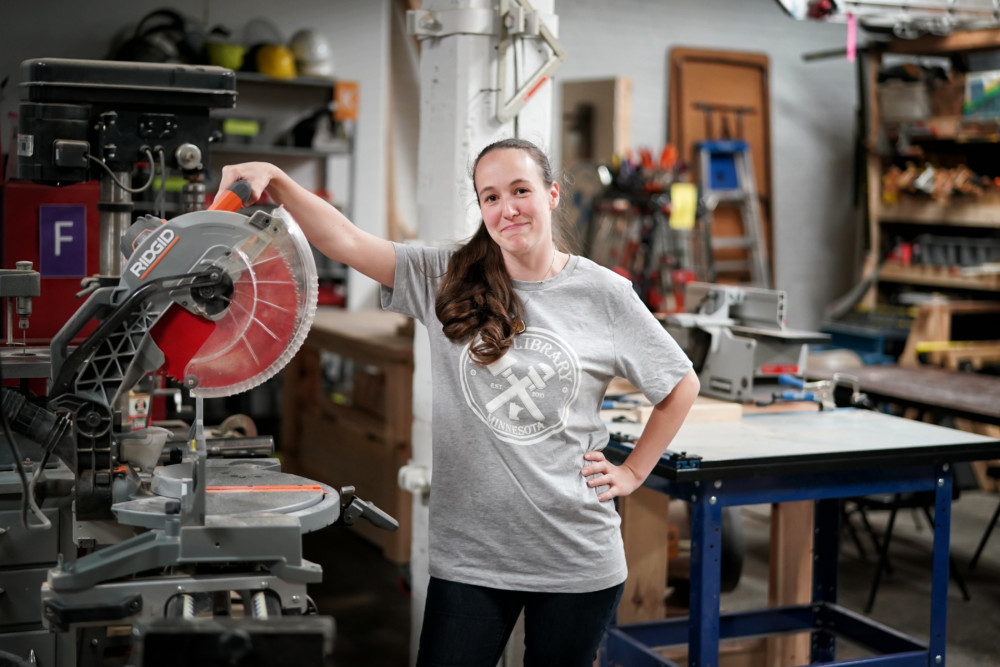By Gail Rosenblum
Star Tribune (Minneapolis)
WWR Article Summary (tl;dr) The Minnesota Tool library has more than 5,000 tools in stock for lending and shop use. It also has 500-square-foot workshops at each branch where members can use specialty tools that are not allowed to be checked out, like drill presses and jointers.
Star Tribune (Minneapolis)
Kate Hersey still has the toy chest she made in her elementary school wood shop. She’s been building, painting, repairing and Pinterest-ing ever since. As executive director of the Minnesota Tool Library, Hersey always has just the right implement at the ready and, she noted, so may you.
The nonprofit MTL is among the Twin Cities’ best-kept secrets, lending thousands of tools to members for a small annual fee, as well as offering classes to the public. But it’s community building that Hersey, a leadership development consultant, is most proud of. The St. Paul resident, who lives in a fixer-upper with her husband and two “tool-wielding” young daughters, talks saws, bits and the beauty of imperfect projects.
Q: Handling power tools is second nature to you. How did this love affair start?
A: My family owns a small painting and contracting business. From the time I was very young, I was on job sites doing work. That’s how I paid for college.
Q: How did the tool library (mntool library.org) come about?
A: Our story is a real example of the power of people. Co-founders Thomas Ebert and Zach Wefel were basically strangers who met at a neighborhood meeting in 2014. Thomas had been a member of the North Portland, Ore., tool library; Zach, like many of our members, had recently purchased a “not new” home and his home improvement journey prompted him to consider the tool library model. By engaging more neighbors to fix their stuff, our community has built a solid nonprofit organization and opened branches in northeast Minneapolis and St. Paul.
Q: How many tools do you offer?
A: Currently,
Q: What might members find on your site, which is as fun and easy to shop as a wedding registry.
A: The selection system is pretty nice! A lot of people think we have mostly hand tools. But we have a lot of power tools, woodworking tools, a ton of home improvement and lawn and garden equipment, some automotive and bicycle repair tools, crafting items (sewing machines, wood burning kits) and seasonal items _ a little bit of everything.
Q: Why not just buy these items?
A: People can and do. But beyond the cost savings, which can be considerable, and the landfill issue, think about all the resources that go into making that item, and the amount of time it’s going to go unused between projects. Do you really want a sawhorse, air compressor or huge ladder sitting in your garage if you’re not doing projects regularly? If the option exists in your community, why wouldn’t you choose to share?
Q: How much does it cost to join?
A: The premium membership is $250 annually, and includes unlimited tool lending for the household, unlimited workshop use and complimentary classes, plus a few other perks. We’ve also got a standard membership ($120 a year) and basic options ranging from $55 to $75. Membership is priced low already, with access in mind, but we’ve started a scholarship fund, as well.
Q: How long can one keep a tool?
A: Normally one week, but the most popular items have a shorter period during high-demand times. Members can also renew online up to three times, just like at the library.
Q: Do you accept donations?
A: Tool donations have built out our inventory. One member’s wife was ailing and they were going to have to downsize. He’d amassed a huge shop which he donated to us to give his tools new life. With few limitations, we’re always happy to accept donations. Our volunteers make sure tools are in functional order.
Q: What training do you offer?
A: We offer classes in introductory tool use and safety, taught by our DIY-ers, makers and craftspeople. Starting in July, we’ll offer our home improvement series, which covers common plumbing repairs, DIY drains and electrical 101, among other topics. All are open to nonmembers, too. We want people to come in and have fun.
Q: Thinking about my own talents with a hammer, do you require a liability waiver?
A: Members sign a standard liability waiver, agreeing to use the tools properly and maintain them. We also show people how to use the tools and encourage them to seek the advice of our librarians and shop mentors. But it’s really up to members to follow procedures.
Q: And let go of perfectionism?
A: My dad has a saying for when things don’t work out quite as planned: “It’s custom.”
Q: What feedback do you get?
A: Low-income families tell us how the library helped them tackle deferred maintenance on their new home. People have built out accessible ramps for family members, crafted beautiful gifts for friends and upcycled furniture destined for the dumpster. One couple converted an old school bus so they could live in it and travel.
Q: So, tools as memory makers?
A: With even the simplest projects, painting a room, putting up crown molding or building that raised garden bed, it’s visceral and rewarding. There’s something incredibly satisfying about saying, “I did that.”
___
Distributed by Tribune Content Agency, LLC.














































































































































































































































































































































































